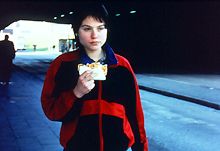Rosetta is more animal than human. She paces furiously around the trailer park where she and her alcoholic mother live. She hisses and throws rocks at intruders. She barks at the landlord who tries to extort sexual favors from her mother. Rosetta is a bundle of raw, undomesticated energy. When she falls into a lake in a brawl, she claws her way out, choking, wheezing, convulsing in a messy display of Darwinian survivalism. Life for Rosetta is a series of self-esteem bashing struggles against society. Besides the lecherous landlord, there are the snide merchants who reject the homemade clothes she sells, the condescending social workers to whom she must grovel, and the silent but accusatorial stares of strangers. So accustomed to defeat and humiliation, Rosetta has grown to tolerate and even depend on her burdens. When she is fired from her job at a waffle factory, she refuses to relinquish her heavy sack of flour. She clings to her burden as if it were her last shred of self-worth. Sometimes, her suffering is self-induced. When she learns that her mother has received food from a local charity, she violently seizes it and throws it out. "We aren’t beggars," she shouts. "Rosetta carries many burdens during the movie," explained the directors after the screening. In addition to the sack of flour, she carries enormous bottles of drinking water, kerosene canisters, and the body of her drunken mother. But the heaviest burden for Rosetta seems to be living itself. Her heavy, agonized breathing fills the soundtrack from start to finish. "Her breathing is the music of the movie," the directors replied when asked about the lack of a musical score. It is their way of externalizing Rosetta’s deeply personal suffering. Rosetta can be watched as a case study in human de-evolution. As her place in society becomes more precarious, Rosetta regresses to primitivism. One by one, her human pieces fall away. First to go are her biological ones, like breathing and speaking. Then her emotional ones: compassion, friendship, and forgiveness. In the final agonizing scene, Rosetta has completely devolved into a collection of broken parts. Unable to communicate what she thinks or feels, she can only stare wildly around her like a confused and injured animal. Dotted throughout the movie are islands of humanity that hint at the remains of a heart inside her battered, impoverished body. When she meets a young man who gives her food and lets her share his apartment, she is so stunned by his generosity that she hardly utters a word. Only at night does she have the courage to whisper aloud to herself that she has a job, a friend who cares, and a normal life. It is the closest Rosetta ever comes to being fully human. But just when her humanity returns, something comes along and pushes her back into savagery. Whether it is the sight of her drunken mother or another lay-off, she loses her grip and falls fast and far. Rosetta protests violently when it happens, but there is a barely detectable sense of relief too. Thankfully, the directors don’t plunge too far into her psychology. They keep a documentary-like detachment which allows her complexity to thrive. For her portrayal of Rosetta, Emilie Dequenne won the Best Actress award at the 1999 Cannes Film Festival (in a tie with Séverine Caneele of L'Humanité). In addition, Rosetta won the Palme d’Or award. It's the most fully formed, complex character study to reach movie screens in a long time. What separates it from all the other cinema-verite explorations of working class Europe is that it doesn’t turn Rosetta into an icon. She is not a symbol of some greater social injustice. She is her own story, nothing more. By minimizing her importance, the movie lets her fill the screen and our imaginations.
|

